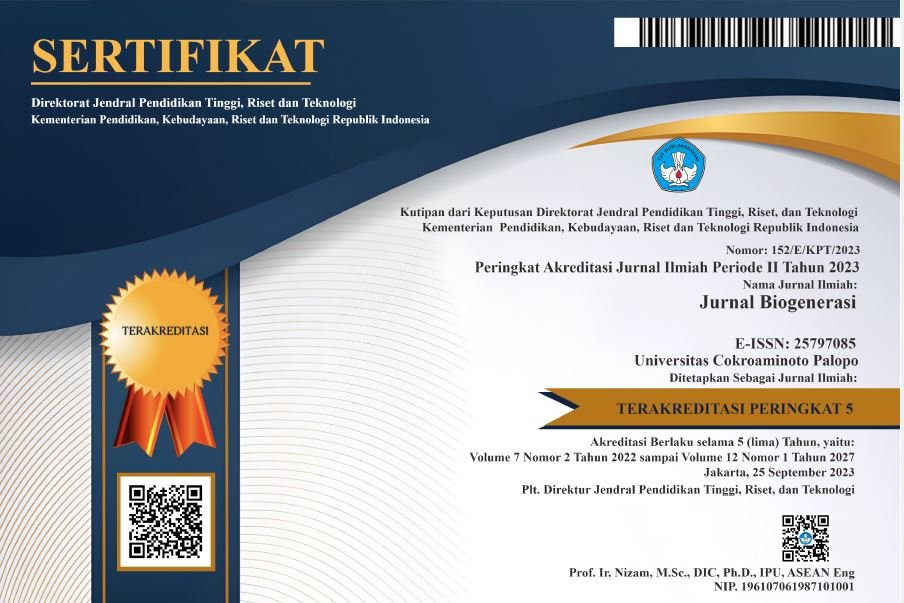VALIDITAS MODUL PEMBELAJARAN ELEKTRONIK BERORIENTASI PENDEKATAN KONTEKSTUAL PADA MATERI INOVASI TEKNOLOGI BIOLOGI
DOI:
https://doi.org/10.30605/biogenerasi.v10i2.5478Keywords:
Electronic learning module, contextual approachAbstract
The aim of this research is to develop an electronic learning module oriented towards a contextual approach to valid biological technology innovation material. This research is development research using the ADDIE development model developed by Branch (2009). This research was carried out to the development stage, namely to the expert validation step, involving 2 lecturers as validators. The instrument used is a product validity test instrument. The data analysis technique used is qualitative and quantitative descriptive analysis. Based on the research conducted, a product has been produced in the form of an electronic learning module oriented towards a contextual approach to Biological Technology Innovation material. The validity test results with an average value of 88.54% meet the valid criteria. The research concluded that the electronic learning module oriented towards a contextual approach to Biological Technology Innovation material was valid.
Downloads
References
Badan Standar, Kurikulum, dan Asesmen Pendidikan 2024. Keputusan kepala badan standar, kurikulum, dan asesmen pendidikan, kementerian pendidikan, kebudayaan, riset, dan teknologi, nomor 032/H/KR/2024, tentang capaian pembelajaran pada pendidikan anak usia dini, jenjang pendidikan dasar, dan jenjang pendidikan menengah pada kurikulum merdeka. Jakarta: BSKAP.
Branch, R. M. 2009. Instructional design: the ADDIE approach. New York: Spinger Science & Business Media.
Cahyadi, A. 2019. Pengembangan media dan sumber belajar: teori dan prosedur. Jakarta: Penerbit Laksita Indonesia.
Daryanto dan Suryanto, B. 2022. Pembelajaran abad 21, rev.ed., Yogyakarta: Penerbit Gava Media.
Kementerian Pendidikan dan Kebudayaan, Direktorat Jenderal Pendidikan Dasar dan Menengah, & Direktorat Pembinaan Sekolah Menengah Atas 2018. Tips dan trik penyusunan e-modul. Jakarta: Author.
Kosasih, E. 2021. Pengembangan bahan ajar. Jakarta Timur: Bumi A
Menteri Pendidikan, Kebudayaan, Riset, dan Teknologi Republik Indonesia. 2022. Keputusan menteri pendidikan, kebudayaan, riset, dan teknologi republik Indonesia, nomor 262/M/2022, tentang perubahan atas keputusan menteri pendidikan, kebudayaan, riset, dan teknologi nomor 56/m/2022 tentang pedoman penerapan kurikulum dalam rangka pemulihan pembelajaran. Jakarta: Mendikbudristek.
Shavira, T., Ertikanto, C., dan Suyatna, A. 2019. Pengaruh penggunaan modul kontekstual berbasis multirepresentasi pada materi gravitasi newton terhadap kemampuan berpikir kritis siswa, Jurnal Pendidikan Fisika Universitas Muhammadiyah Metro, 7(2): 143-155.
Sistem Informasi Kurikulum Nasional Pusat Kurikulum dan Pembelajaran 2022. Kurikulum merdeka, 2022. https://kurikulum.kemdikbud.go.id/kurikulum-merdeka/. (Diakses 22 September 2022).
Suastika, I. K., dan Rahmawati, A. 2019. Pengembangan modul pembelajaran matematika dengan pendekatan kontekstual, Jurnal Pendidikan Matematika Indonesia, 4(2): 58-61.
Sutaman, K., Yeni, L. F. Dan Nurdini, A. N. 2015. Penerapan modul belajar pada materi protista terhadap hasil belajar siswa kelas X SMA, Jurnal Pendidikan dan Pembelajaran Khatulistiwa, 4(6): 1-15.
Widiastuti, N. L. G. K. 2021. E-modul dengan pendekatan kontekstual pada mata pelajaran IPA, Jurnal Ilmiah Pendidikan dan Pembelajaran, 5(3): 435-445. doi: https://dx.doi.org/10.23887/jipp.v5i3.37974
Wulandari, D. D., Adnyana, P. B., dan Santiasa, I. M. P. A. 2020. Penerapan e-modul interaktif terhadap motivasi hasil belajar siswa pada pembelajaran biologi kelas X, Jurnal Pendidikan Biologi Undiksha, 7(2): 66-80.
Yaumi, M. 2018. Media dan Teknologi Pembelajaran. Jakarta: Prenadamedia Group.
Downloads
Published
How to Cite
Issue
Section
License
In submitting the manuscript to the journal, the authors certify that:
- They are authorized by their co-authors to enter into these arrangements.
- The work described has not been formally published before, except in the form of an abstract or as part of a published lecture, review, thesis, or overlay journal.
- That it is not under consideration for publication elsewhere,
- That its publication has been approved by all the author(s) and by the responsible authorities – tacitly or explicitly – of the institutes where the work has been carried out.
- They secure the right to reproduce any material that has already been published or copyrighted elsewhere.
- They agree to the following license and copyright agreement.
License and Copyright Agreement
Authors who publish with this journal agree to the following terms:
- Authors retain copyright and grant the journal right of first publication with the work simultaneously licensed under Creative Commons Attribution License (CC BY 4.0) that allows others to share the work with an acknowledgment of the work's authorship and initial publication in this journal.
- Authors are able to enter into separate, additional contractual arrangements for the non-exclusive distribution of the journal's published version of the work (e.g., post it to an institutional repository or publish it in a book), with an acknowledgment of its initial publication in this journal.
- Authors are permitted and encouraged to post their work online (e.g., in institutional repositories or on their website) prior to and during the submission process, as it can lead to productive exchanges, as well as earlier and greater citation of published work.


.png)

